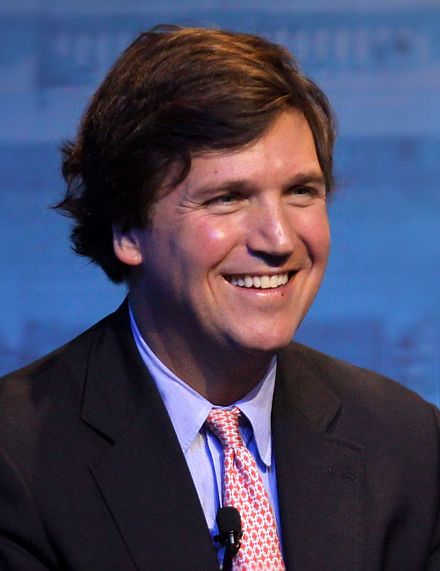Nationalism confronts the question our elites struggle to escape.
Seeing Past the Past

Carlson's provocations are captivating, but his solutions can't capture the center.
Tucker Carlson likes being on the offensive.
Tucker Carlson Tonight has distinguished itself by walking a careful line between shock jock audacity and a higher-minded strain of social commentary. Its host has struck a chord with people hungry for a serious conversation about America’s future and the common good.
This is nowhere more evident than in the reactions to Carlson’s viral monologue which aired January 2 of this year. In this speech, he denounces America’s elites as market-worshipers who are indifferent to the welfare of their fellow citizens. Insisting that global markets should be viewed as “a tool” in service of higher ends, Carlson argues that a strong economy and nation ultimately depend on a healthy culture, oriented around marriage and family.
If we hope to build such a culture, he suggests, we must recover an essential ingredient: male breadwinners. Women won’t marry men who earn less than they do, and families can’t thrive without husbands and fathers. Therefore, we should do whatever we can to boost male wages, while curbing influences that undermine would-be breadwinners. Those might include antipoverty programs (which may replace husbands with welfare checks), feminist messaging (urging women to “lean in” when it’s probably preferable for them to lean out), and economically disruptive trade arrangements. In other recent appearances, Carlson has highlighted the benefits of banning driverless vehicles in the interests of preserving jobs for men. Clearly, in his mind, America’s cultural renewal is heavily dependent on getting men back to work.
Carlson’s provocative suggestions have generated lively debate on the political right. That’s heartening to see, even for people like myself who view him as a somewhat demagogic figure. There are reasons to appreciate a cultural critique that forces the rest of us to articulate our own vision of the future with more clarity. Fundamentally, Carlson is forcing conservatives to confront the reality that men cannot live on bread alone. People need a culture, a respected social space, and meaningful activity in order to thrive. As Matthew J. Peterson has pointed out in his response to Carlson, these are important truths that some of Carlson’s critics have difficulty acknowledging.
From a political standpoint, however, Carlson’s solution doesn’t look terribly promising. It’s hard to imagine the Republicans capturing the American center with a platform that calls for banning culturally disruptive technologies and working to ensure that men have more earning power than women. Still, it’s not strange that this message would appeal to someone who feels that his culture has collapsed and sees no effort being made to rejuvenate it. Carlson’s vision doesn’t need to be realistic if he’s the only person who’s offering one. If his unlikely proposals represent the only alternative to catastrophic cultural decline, shouldn’t we at least give them a try?
To counter Carlson’s message, conservatives must offer more than platitudes. Markets may be powerful; limited government may be wise. If we respect these traditional conservative principles, however, what can be done?
It’s difficult to predict the precise contours of future labor markets, but let’s imagine that the dystopian populist vision does in fact come to pass: labor markets find their equilibrium, and it isn’t egalitarian in the least. Suppose for a moment that we’ve stepped into a world in which the economy revolves around a relatively small cluster of large companies, which are enormously productive with very few employees. The technocratic titans who run these corporations are spectacularly wealthy and want for nothing. Meanwhile, we plebs spend our days providing services to the elites (and one another), which means that some of us polish ball room floors while the rest sweep streets, fix teeth, teach yoga classes, care for children and the elderly, serve smoothies, make custom furniture, provide security, and water tulip beds.
In such a world, many of us may rely to some extent on redistributive programs: wage subsidies, child allowances, or possibly a universal basic income. A fair number may support ourselves through gig work, which means that we won’t find much community through a workplace per se. Perhaps we’ll lean on state programs now and then for financial security, and for companionship we have to rely on family, neighborhood associations, churches, clubs, grassroots worker organizations, or school friends. Easing into adulthood will be a bit more complicated than in days of yore, since it will take time for each person to figure out what he’s equipped to do.
The fluidity of labor markets is potentially disorienting, but there are big upsides. This could be a world in which most adults spend their days improving the community in some fairly direct way. Instead of pouring manpower into factories and coal mines, we could put more of it into building and maintaining community facilities, improving standards of care for the young, old, and sick, and ensuring high levels of security and education across the board. Art and leisure could be a prominent part of community life, with a range of activities and entertainments available to all citizens, either free or at low cost. Relatively few people would need to work long hours at boring, repetitive jobs.
In short, this could be a world in which many people’s wages are relatively low, but work hours are short, and it’s easy for anyone to learn a new hobby, go for a hike, attend a concert, or take the kids to the playground. Prosperity can make those kinds of goods widely available, either through public subsidy, or as a gift of wealthy benefactors. Why would this necessarily be such a terrible future? Isn’t it really better if the park and the concert hall are at the center of community life, rather than the factory?
There are, to be sure, some reasonable concerns one might have about this vision. An ultra-wealthy elite might gain a dangerous level of influence in such a world, enabling them to suffocate communities whose prevailing worldview offends them. Low wages could undermine work incentives, leaving many people idle and dissolute. We should also reflect on Carlson’s hapless would-be breadwinners, doomed to a life of loneliness because their paychecks are too small. How do we get these thriving communities, if men and women aren’t marrying in the first place?
These are real problems, but soluble. The building of a robust community life will always of necessity be the work of a creative minority. That’s true no matter what policy course we choose. To fend off the tyranny of an influential elite, though, we need to reinforce democratic norms, while also working to build up ties between elites and ordinary communities across the nation. Try to ensure that every community has a few champions who are able and willing to act as benefactors and public advocates. To discourage idleness, try to stigmatize laziness, while attaching more non-financial rewards (social status, respect, opportunity) to valuable activities that aren’t naturally remunerative. Also, structure redistributive programs in such a way as to keep the profit motive relevant, even at a low level.
The lonely-hearted men are a challenge, but we should bear in mind that men historically have found myriad ways to demonstrate their suitability as husbands and fathers. In some cultures, women handled agriculture and small-time commerce while the men served as hunters and warriors. In others, production was primarily a family affair, and almost nobody could brag about his personal earning power. Slaves in many societies had no earning power at all, but they generally still wanted to marry. Women will always prefer capable and energetic men to lazy incompetents, but the fixation on earning power is highly contextual. If modern men can find ways to serve their communities and win widespread social respect, I predict that women will marry them, regardless of the precise economic situation. If all else fails, grow muscles. Women still like them, even in an information age.
We shouldn’t reject Carlson’s suggestions simply because they fly in the face of conservative orthodoxy. We should reject them because these measures will make it harder to realize the prosperous future that we should want for our children and grandchildren. Whatever his motives, Carlson has done some good by forcing conservatives to speak more plainly about the common good, cultural renewal, and human thriving. He’s right that markets shouldn’t be valued purely for their own sake. But that doesn’t mean that they’re the kind of “tool” that can unlock a passageway to a past era. We need to move forward. It’s time to persuade our embittered compatriots that there are better ways to build a good life.
The American Mind presents a range of perspectives. Views are writers’ own and do not necessarily represent those of The Claremont Institute.
The American Mind is a publication of the Claremont Institute, a non-profit 501(c)(3) organization, dedicated to restoring the principles of the American Founding to their rightful, preeminent authority in our national life. Interested in supporting our work? Gifts to the Claremont Institute are tax-deductible.
Two course corrections, one trajectory: Reformicons and Populists need each other.
The American Founders and Lincoln knew what Tucker Carlson's critics do not: American Government exists to help Americans.
Reflections on the monologue that rocked the Right.




